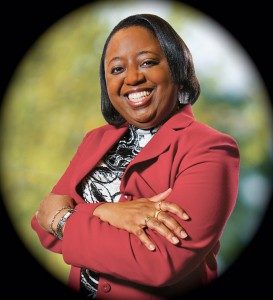Newark, DE resident, Sonya Barkley, had what most people would consider a healthy, happy life. As a young person she was active, and played baseball, softball and volleyball. She had never been sick in her life, and didn’t know how devastating illness could be until she was in her 30s.
On a summer day after work, Sonya came home and thought she wasn’t feeling well because of the hot, humid weather. She began to feel dizzy walking to her house and braced herself on a tree, trying to rest until the dizziness subsided. She passed out and only remembers coming to with her mother standing over her trying to revive her. Sonya’s ankle hurt and she was disoriented. She was admitted to the hospital, and learned that the pain in her ankle was a serious break that happened when she lost consciousness and fell.

After her heart was stabilized, Sonya had ankle surgery and went back to work. She didn’t have any incidents for nearly six years. She was happy during this period and was teaching math and helping young students through an after school program in her area. She had forgotten about how frightening her symptoms were, until all of the old feelings began rushing back one afternoon. She broke out into a cold sweat. She was dizzy, and knew that she would soon collapse. Still at work, she immediately called her supervisor and mother to ask for help.
This time in the hospital, doctors told her that she was in heart failure and that her only hope would be to receive a heart transplant. She knew that she wouldn’t be able to leave the hospital. “I was just trying to make it through every day and night.” said Sonya. “My heart rate would drop so low at night that nurses used to have to come in and check on me. I would lose consciousness and need to be defibrillated.”
Sonya’s heart rate would also rapidly increase to frightening levels, and she started retaining excessive amounts of fluid in her legs and stomach because her kidneys were being affected by her declining heart function. While she waited for a life-saving heart transplant, her fluid retention became severe that her skin burst open because it could no longer support the excess. Her health continued to worsen, and she wasn’t able to get out of bed without feeling like she was suffocating.
Then, her wish came true – she was told that there was a matching donor and that she would receive a second chance at life. “I’m so grateful for the person who gave me this heart. I wouldn’t be here without it. I’ve always believed in helping people and uplifting others. Now, I want to share my story to inspire others and encourage them to register.” said Sonya.
Today post-transplant, life is much different for her. She has energy to do things that she never did before her transplant. She does aerobics, swims and is happy to spend time with friends and family. She’s grateful for her mother and sister, who stood by her and were her caretakers during this challenging journey. She’s also back to teaching – working as a substitute teacher and looking for a full time position to teach math.
“One of my main motivators to get better was my niece, Adrienne. She was only five years old when all of this started. Because of my donor, I’ve been able to watch her grow. I used to visualize Adrienne growing up when I was in the hospital – and us two kicking a ball in the backyard and having fun. I prayed on this.” she said. “It’s such a blessing that I received a new heart. It’s hard to put into words. Being a donor is one of the most selfless things a person can do. It can give someone a normal life. You can save someone’s life.”
In the United States, 20 people die each day while waiting for a life-saving organ transplant. In Gift of Life’s region – eastern PA, southern NJ and DE – there are more than 5,300 people waiting, and nationally more than 115,000 men, women and children are on the waitlist – 30 percent of whom are African American. The chances for a successful transplant increase significantly when people of the same ethnicity are matched, so it is crucial that donors of all ethnic backgrounds register as organ and tissue donors. During Black History Month, Gift of Life is promoting the stories of African Americans in the region who are waiting for organ transplants, who were donors or are donor family members, and those whose lives have been saved by organ donation. Through increasing awareness and education about donation and transplantation, more lives can be saved.
